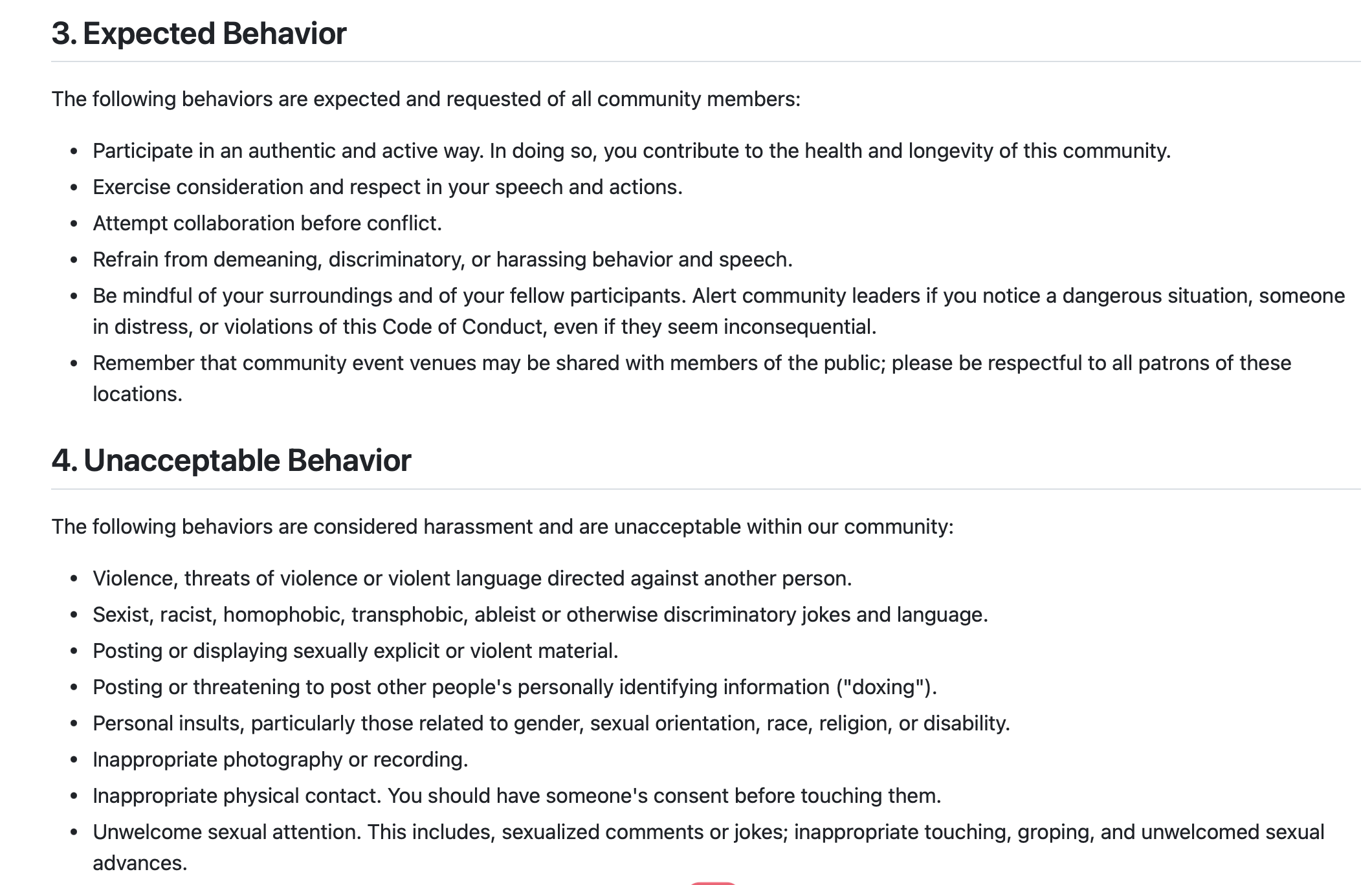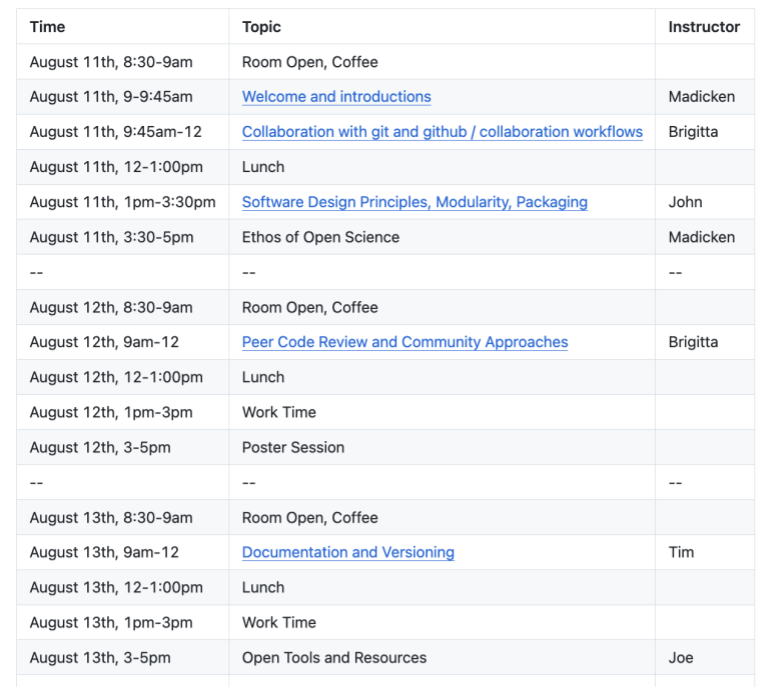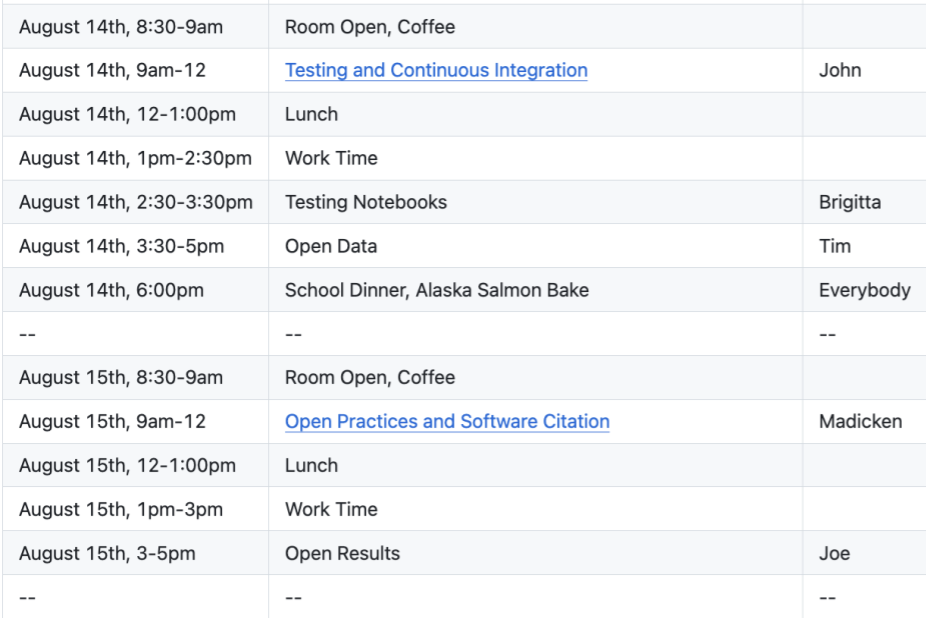
Welcome to the URSSI Summer School on Research Software and Open Science¶
Overview¶
- Revisit logistics + tools
- Provide motivation for this school
- Introductions + Icebreaker
Summer School Details¶
Useful Links¶
- Zulip (chatting, planning): https://urssi-softwareschool.zulipchat.com
- HackMD (collaborative notes): https://hackmd.io/@M0eajM-mS9CDKKt8Rq--0g/rJjaxzDdgg
- Wifi:
eduroamwith your university credentialsUAlaskawith usernameASFOSUSummerSchooland passwordasfosusummerschool
Code of Conduct¶
The Code of Conduct for URSSI summer schools can be found here: https://github.com/si2-urssi/summerschool-Aug2025/blob/main/CODE_OF_CONDUCT.md

Code of Conduct¶
Reporting: please email madicken.munk[at]oregonstate.edu, jhkennedy@alaska.edu or talk to either/both Madicken Munk and Joseph Kennedy for CoC reporting.
Masking Policy¶
At this summer school we do not require masking.
However, please consider wearing a mask especially if you are feeling sick to limit the risk of spreading airborne diseases while sitting and listening; feel free to take it off when asking questions so you’re not muffled.
Free masks are available at the registration desk (with cool ASF logos!).
Details about This Space¶
- Bathrooms are located out of the room, to the left
- Reusable water station is at the entrance of the room, to the left
- Check in will happen every day at the start of the day and after lunch
Instructors and Organizers¶

Helpers¶
- Lucio Queiroz
- Sujay Shankar
- Cong Gao
Schedule and plan for the next few days
https://github.com/si2-urssi/summerschool-Aug2025?tab=readme-ov-file#tentative-schedule

Schedule and plan for the next few days
https://github.com/si2-urssi/summerschool-Aug2025?tab=readme-ov-file#tentative-schedule

About this School¶
URSSI mission¶
To improve the quality, usefulness, and sustainability of research software by improving practices of software development used in research.
Motivation¶
- Nearly all research relies on software
- Even experimental research
- But researchers don't get trained in best practices in the same way as experimental methods
Motivation¶
- Software is key infrastructure for research and science.
- Let's talk about the Alaska Satellite Facility and how software and research intersect
What are we going to learn about: Research Software?¶
- Software design
- Structuring (Python) programs
- Collaborative software development
- Software testing, continuous integration
- Packaging and documentation
- Peer code review
- Sharing software openly, copyright, software citation
What are we going to learn about: Open Science?¶
- Ethos of open science
- Open tools and resources
- Open Data
- Open Results
Open Science 101: Five Modules Organized as a Workflow¶

Structure¶
- Five Full days of research software + open science content
- Three-hour sessions in the morning, four hours in the afternoon.
- Morning: research software
- Early Afternoon: work time + help from instructors and helpers
- Late Afternoon: open science
- Tuesday: poster session with attendance by Alaska Satellite Facility and Geospatial Institute Staff
Requirements / setup¶
A laptop with a Mac, Linux, or Windows operating system, and some packages installed:
- the Bash shell
- Git
- Python 3.x; we recommend installing miniforge for these tutorials
- a text editor, preferably one designed for writing code (vim, emacs, vscode, etc.)
... and some additional resources
- GitHub account, with ssh keys (or https) set, and your git configured
... sticky notes!!!
Final Expectations¶
- At the conclusion of this course you will be badged for the OS101 course content, which will be associated with the email you provided in the pre-event survey (and eventually your ORCID).
- Your attendance is expected every day of the school, missing content may forfeit your badge and your stipend.
Introductions and Icebreaker¶
Introductions¶
- Who are you?
- What do you do, and where do you do it?
- What do you hope to get out of this?
- Fun fact: What is your favorite colormap?
- Backup fun fact: What is your favorite "dad" joke or bad pun?
Attribution: OS101 Community¶
This week's modules on Open Science are made possible thanks to the work of the entire NASA Open Science 101 community (3100+)!
We also thank everyone around the globe who has worked to promote and implement open science over the years - they have paved the way for where we are today!
Today¶
- Collaborating with git and github
- Software Design Principles, Modularity, and Packaging
- Ethos of Open Science